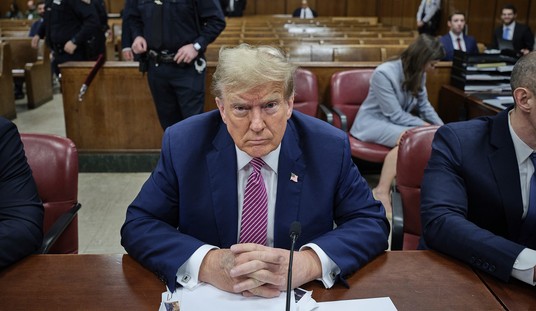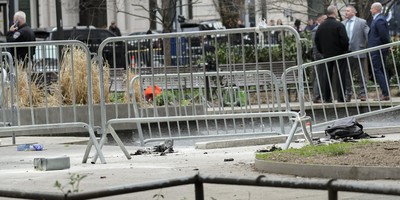British journalist Tony Harnden has the scoop, via RealClearPolitics:
The CIA had concluded that the base contained a secret prison in which a number of western hostages were languishing. James Foley, 40, an idealistic freelance journalist from New Hampshire who had once been kidnapped in Libya and held for 44 days, was thought to be among them. When the commandos reached the base, scores of Isis fighters swarmed out. A US air force AC-130 gunship laid down a wall of fire, killing up to 15 of the jihadists. According to locals, some of the commandos were wearing Jordanian insignia, perhaps to mask their nationality. They entered the buildings and found the prison. But the hostages were not there. The special forces troops had found what they term a “dry hole”...Pentagon sources said Foley and the others might well have been rescued but Obama, concerned about the ramifications of US troops being killed or captured in Syria, took too long to authorise the mission. Anthony Shaffer, a former lieutenant-colonel in US military intelligence who worked on covert operations, said: “I’m told it was almost a 30-day delay from when they said they wanted to go to when he finally gave the green light. They were ready to go in June to grab the guy [Foley] and they weren’t permitted.” Another US defence source said: "The White House constantly goes back and forth on these things. These people are a bunch of academics who endlessly analyse stuff and ordering up another deep-thinking paper but can't decide what to order for lunch."
Read Allahpundit's analysis of this report, which is excellent. He links to a New York Times story on the rescue attempt, which quotes a Pentagon official as suggesting that ISIS must have moved the prisoners just before the special forces operation. It was a "matter of hours, perhaps a day or two," the Defense Department source told the Times. So the actionable intelligence was time-sensitive, yet if Harnden's sources are to be believed, it took weeks to secure presidential approval for the mission. Why? "The White House’s fears of a debacle a la Desert One or Mogadishu are understandable, but less understandable now than they were before the Bin Laden raid," Allahpundit reasons. "Even if the Foley raid had fallen apart, what would the knock on Obama have been? That he had too much faith in the capabilities of soldiers who scalped the head of Al Qaeda and then exfiltrated without a single American casualty? The foot-dragging is also hard to explain. He took his time in ordering the Bin Laden raid, with internal deliberations extending over several months, but extra prudence was warranted in that case: Pakistan is (nominally) an ally, there were no innocent lives directly in the balance, and the White House had no reason to believe that Bin Laden would flee the scene before they got there. As I recall, intelligence showed he’d been at the Abbottabad compound for years. With Foley, that equation changed. The raid was aimed at enemy territory, the prisoners were being moved, and they could have been killed at any time," he writes.
Recommended
All very strong points. The OBL raid required intricate planning and some degree of certainty because the costs of failure would have been catastrophic on multiple levels (letting bin Laden slip away, inflaming our nuclear-armed "ally" with nothing to show for it, etc). In this case, the biggest political risk was putting boots on the ground, and in harm's way, in Syria -- a country in which Obama failed to enforce his own military red line just last year. But now we might end up engaged in Syria anyway, but with very different objectives. During last summer's debate, we were discussing strikes against the Assad regime. Today, we're talking about entering the country to defeat ISIS, which is intent on overthrowing the Assad regime and expanding its Islamist caliphate. The butcher we threatened to bomb last year now stands to benefit from our anti-ISIS campaign. Some reports suggest that we might even be collaborating with Assad to that end. What a difference a year makes.
Before you go, let's check in on another 'Smart Power' misadventure. The Obama administration "led from behind" and participated in a war to depose Libya's dictator from power in 2011, without Congressional authorization. When Obama's War Powers Act authority expired, even according to his own lawyers, he essentially found new lawyers and extended the hostilities. In the resulting power vacuum, the State Department failed to protect its personnel on the ground in Libya, ignoring and denying multiple requests for additional security in the country's most dangerous region. That led to 2012's Benghazi massacre. Less than two years later, the US was forced to evacuate our embassy in Tripoli as the country descended into full-fledged, failed-state chaos. That slide into the abyss is on the brink of completion:
Islamist militias have seized control of Libya's main airport, setting planes and surrounding buildings ablaze.The group called Dawn of Libya, consisting mainly of fighters from Misrata, captured the major foothold in Tripoli at the weekend from a rival faction from Zintan in western Libya. The fight has largely destroyed the airport and scarred the capital, prompting diplomats, foreign nationals and thousands of Libyans to flee. It followed weeks of fierce fighting. The group said it has also taken hold of other locations in the capital controlled by rival militias. The fight has largely destroyed the airport and scarred the capital, prompting diplomats, foreign nationals and thousands of Libyans to flee.
There seems to be a worse, scarier actor around the corner in this region -- ISIS being the worst and the scariest. In the face of these complexities and threats, our foreign policy is incoherent and completely adrift.

























Join the conversation as a VIP Member